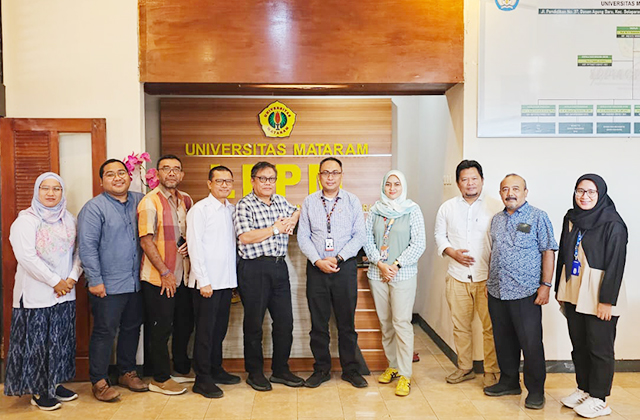Unram and BRIN Encourage Coastal Economic Development Through Seaweed in Three Regencies of Lombok Island

Mataram, University of Mataram – In a meeting between the Research and Community Service Institute of University of Mataram (LPPM Unram) and the Director of Research and Innovation Partnership of the National Research and Innovation Agency (BRIN) on Tuesday, 17 September 2024, a strategic collaboration will be established to encourage the economic development of coastal communities, especially in West Lombok, East Lombok and Central Lombok regencies, with a main focus on seaweed cultivation.
This collaboration is expected to improve the welfare of coastal communities while utilising the potential of seaweed as a high economic value commodity. Some aspects that become the main focus in this collaboration are mentoring UMKM seaweed, institutional strengthening, and technological intervention.
This event was attended by the Vice Rector for Planning, Cooperation, and Information Systems of Unram, Prof. Akmaluddin, S.T., M.Sc.(Eng), Ph.D.; Head of LPPM Unram, Prof. Dr. Ir. Sukartono, M.Agr.; and Prof. Dr. Ir. I Gusti Putu Muliarta Asryana, M.P.
Present from BRIN, namely Plt. Director of Research Partnership and Innovation of BRIN, Muhamad Amin along with his team and several researchers consisting of Dr. Nunik Cokrowati, S.Pi., M.Si.; Ir. I Gusti Lanang Parta Tanaya, M.Sc., Ph.D.; Eka Sunarwidhi Prasedya, Ph.D.; and Dr. Kurniawan.
This initiative aims to combine Unram’s academic research expertise with BRIN’s innovation and technology capacity, in the hope of creating practical solutions to the challenges faced by seaweed farmers in coastal areas.
In his speech, the Head of LPPM Unram, Prof. Sukartono expressed optimism about the potential of this collaboration.
“The strategic collaboration in seaweed between Unram and BRIN is an important step that will integrate various aspects of research and innovation to provide maximum impact for coastal communities. We have many researchers who are experts in various fields related to seaweed, including aspects of cultivation, biotechnology, socio-economics and institutional,” he said.
“Through downstream research, this collaboration focuses on transforming knowledge and technology into practical solutions that can be directly benefited by the community, especially in the context of developing seaweed cultivation in the coastal areas of West Lombok, East Lombok and Central Lombok. We are committed to facilitating this process by providing the necessary assistance to ensure that the research conducted by Unram can be effectively implemented to improve the local economy and strengthen the economic resilience of coastal communities,” Prof. Sukartono continued.
The Professor of the Faculty of Agriculture revealed that, “This collaboration plan will be continued with the signing of a cooperation agreement between Unram and BRIN.”
Meanwhile, the Acting Director of Research Partnership and Innovation of BRIN, Muhamad Amin, stated that this collaboration is part of BRIN’s commitment to support the development of Indonesia’s maritime sector.
“Seaweed has a great strategic and promising economic potential. Through research and innovation supported by this collaboration, we hope to increase the productivity and added value of seaweed and open greater market opportunities for farmers in coastal areas,” he said.
Furthermore, Muhamad Amin said, “As a Deputy at BRIN, our main task is to ensure that the results of research conducted by Unram researchers can be implemented effectively to meet the needs of the community. Within the framework of this collaboration, BRIN has the authority to bridge the gap between the innovations produced and their application in the field.”
It is hoped that this collaboration will have a significant economic impact on coastal communities in the three regencies, with increased income for seaweed farmers and wider market development. In addition, this collaboration is expected to strengthen Unram’s position as an educational institution committed to its excellent mission, which is to make a positive contribution to society through research and innovation.
With this support and collaboration, it is hoped that West Lombok, East Lombok and Central Lombok can witness profound positive changes in the seaweed farming sector, as well as improvements in the standard of living of their coastal communities.
